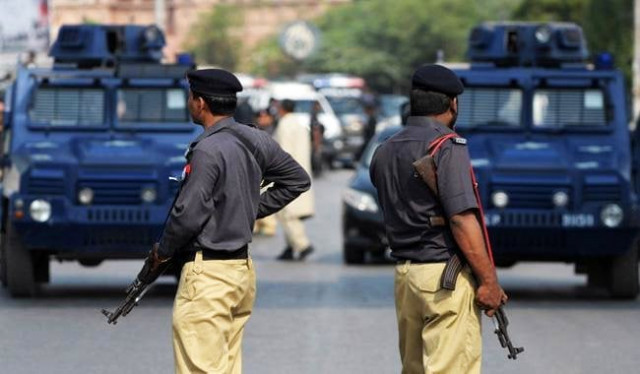Sindh govt empowers itself with greater control over police
Act curtails authority of IG while home dept enjoys additional powers

Sindh Police PHOTO: FILE
A copy of the law available with The Express Tribune reads, “Postings of senior police officers from the ranks additional IG to SP shall be done by the home department through selection from a panel of three officers on the recommendation of the IG”.
The sources in the home department said that the IG’s recommendation is however not binding and instead the home department has full authority of making decision on the postings of senior police officers.
“The Sindh High Court in its decision has asked the government to give administrative and financial powers to IG, who can post senior police officers. The court has also directed the Sindh government to make the law in light of its judgment, but the situation seems otherwise in this law,” sources said.
Regarding the tenure, transfer and posting of police officers, the law said, “The government shall seek the services of an officer below grade 21 from the federal government by sending a list of three potential candidates for the appointment of IG in the province. The federal government shall then place the services of one such officer at disposal of the provincial administration, who shall be appointed IG.
Sindh govt's final reply sought on formulation of police transfer, posting rules
The Sindh police chief shall enjoy tenure of not less than three years from the date of posting unless he attains the age of superannuation.” The law further said that the government may transfer the IG before completion of tenure if convicted by a court in any criminal case or where the charges have been framed against him by a court involving corruption or moral or criminal offence.
“Government can also initiate premature transfer of IG for unsatisfactory performance of duties,” the bill further states, “Subject to supervision and control of IG, an additional IG, DIGs and head of district police shall make the postings of constables, head constables, assistant sub-inspectors and inspectors.”
Direct appointment
After this law, provincial government will directly be able to appoint DSP and inspectors through competitive examinations.
“25% inspectors will be appointed on merit through the tests amongst graduate candidates, on the recommendation of Sindh Public Services Commission and 75% by promotion from sub- inspectors on recommendation of the relevant promotion board,” the law said.
Similarly, the law also mentions that a monitoring and coordination authority under the supervision of the home and law ministers will work as its vice-chairman while the chief secretary, advocate general, home secretary, IG, law secretary, secretary finance, and prosecutor general will be its members.
Tightening security: Sindh govt for registration of Chinese nationals
The authority will frame the policies for smooth functioning of police department. Other proposed members include, advocate general, prosecutor general, a retired grade 21 civil servant and police officer along with four eminent persons of which at least one shall be woman and one a minority.
The government will also constitute a district police complaint authority for examining and holding inquiry into all types of complaints against police officers up to rank of inspector. The district committees will be headed by retired district and session judge. Similarly, a criminal justice and coordination committee will also be established in the province with district and session judge as its chairperson and deputy commissioner. The committee in each district will review the operation of the criminal justice system and work towards the improvement of the system as a whole.
Civil society irked
The law has invited the ire of civil society. Rights activist Iqbal Detho who has also worked extensively on police reform said that the high court in its judgment has maintained to ensure autonomy of command and independence of operation of police for protecting fundamental rights of citizens and achieving public good.
“This Draft Act appears to further strengthen the political and bureaucratic control over police instead of external public oversight through democratic institutions, independent bodies and civil Society,” he said, adding that under the proposed changes police would be governed by provincial bureaucracy and parliamentarians.
“This proposed act has been prepared without seeking inputs from relevant departments as required by Rules of Business of Sindh Government 1986,” he said adding that various provisions of the act are curtailing the administrative, financial, and operational powers of the IG, by government interference into its administrative domain and diluting the autonomy of the police chief which is contradictory to the court orders.



















COMMENTS
Comments are moderated and generally will be posted if they are on-topic and not abusive.
For more information, please see our Comments FAQ